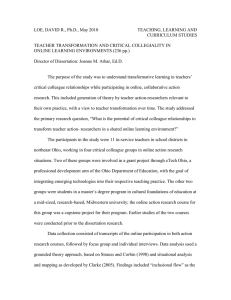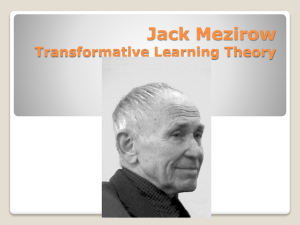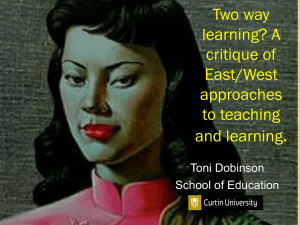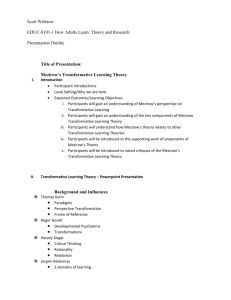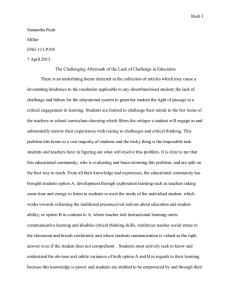Jack Mezirow's Transformational Learning Theory Explained
advertisement
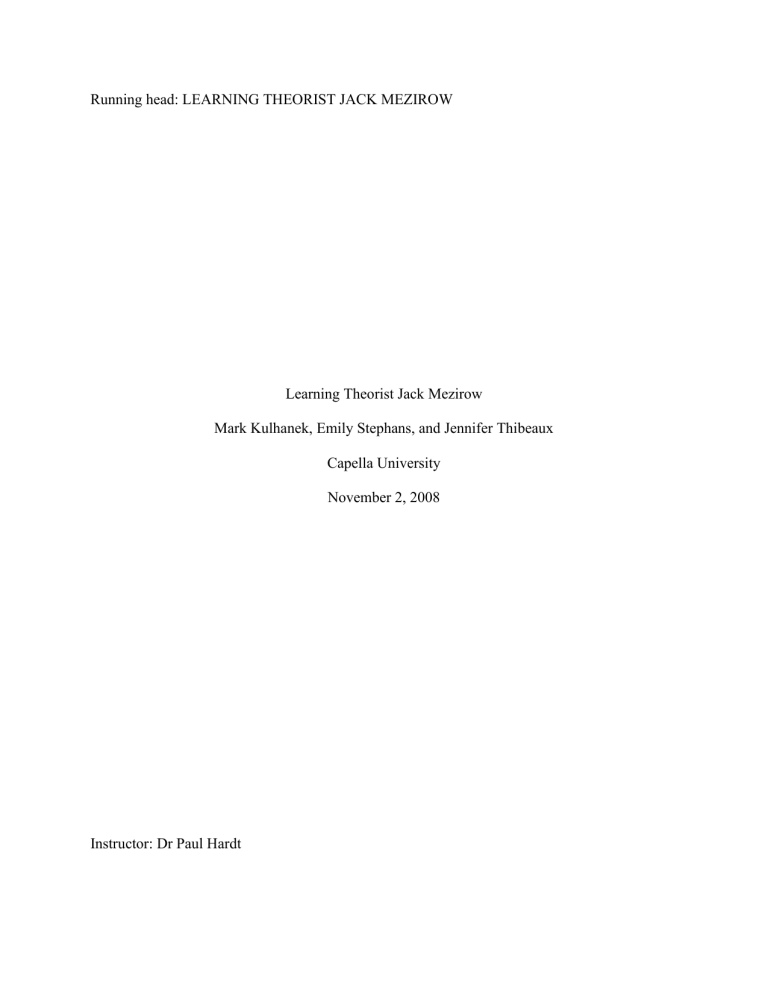
Running head: LEARNING THEORIST JACK MEZIROW Learning Theorist Jack Mezirow Mark Kulhanek, Emily Stephans, and Jennifer Thibeaux Capella University November 2, 2008 Instructor: Dr Paul Hardt Table of Contents List of Tables 3 Learning Theorist Jack Mezirow 4 Overview of Mezirow’s Work 4 Transformational Learning Theory 4 Transformative Learning 5 Theory Application and Facilitation 6 Implications 7 References 8 List of Tables Table1. Elements of Transformational Learning Theory 5 Learning Theorist Jack Mezirow Jack Mezirow played a significant role in adding to our understanding of adult learning. He is “recognized for initiating a transformative learning movement in the field of adult education” (Hall of Fame, 2003). His contributions started in the 1970’s with Perspective Theory, which led to the development of Transformational Learning Theory. His ideas can be applied to the facilitation of adult learning experiences. Overview of Mezirow’s Work Professor Mezirow's research interests are in adult learning and education. His work has initiated a transformative learning movement in adult education (Mezirow, 2008). Mezirow is now a retired professor but continues to lecture and contribute to research in the area of adult learning. In his early pursuit of adult learning theory, Mezirow developed the Perspective Theory which sought to understand a person’s choice to perform differently given an opportunity to reflect and have perspective. Unfortunately, the theory relied on a disorienting dilemma such as a death, illness, etc. While the theory is valid, it cannot be leveraged in a learning circumstance on a consistent basis. The Perspective Theory eventually grew into the Transformational Learning Theory which differed from his earlier work in that the latter meaning structures and frames were identified and leveraged to make the transformation. Transformational Learning Theory Inspired by constructivists such as Piaget, Bruner, and Montessori, Mezirow sought to develop a type of learning that transformed students’ ideas and concepts by leveraging existing knowledge and maturing thought. In 1978, Mezirow introduced the concept of transformative learning in his groundbreaking study of women who returned to community college (Learning, 2008). The theory reflects on the person’s meaning structures (See Table 1). MEANING STRUCTURE Meaning Perspectives Meaning Schemes Sociolinguistic Codes Concept Psychological Codes Belief Epistemic Codes Judgment Table1. Elements of Transformational Learning Theory Meaning perspectives is the first of two categories for meaning structure. That category is further delineated into three codes – sociolinguistic codes, psychological codes, and epistemic codes. The other category of the meaning structure is the meaning scheme. This scheme considers the meaning of concept, belief, judgment, and feelings. Mezirow considers reflection to be the tool that allows a learner to understand their meaning structure. Transformative Learning Imel (1998) states that “a defining condition of being human is that we have to understand the meaning of our experience.” For some, meaning is provided to them by others, which they readily accept. Others have a need to develop meaning through their own interpretation of events. How events are interpreted by an individual is based on how previous events were processed, their understanding, and the context of their culture. Mezirow’s theory of transformative learning is an approach emphasizing three concepts. These are “centrality of experience, critical reflection and rational discourse” (Imel, 1998). For change to take place, an individual’s beliefs, values, and assumptions must be disrupted. It requires some disturbance to provide the motive and opportunity to transform their belief system. This leads to a change or transformation in their perspective. This is considered a life-long process. Theory Application and Facilitation Mezirow developed a theory about adult learning which emphasizes changes in perspective through transformational learning. He called this “rational, cognitive process of critical reflection, perspective transformation” (Robinson and Clune, 2001). Being faced with challenges to beliefs, values and attitudes can be disruptive to a worldview and anxiety producing. “Transformational learning occurs when individuals change their frames of reference by critically reflecting on their assumptions and beliefs and consciously making and implementing plans that bring about new ways of defining their worlds” (Imel, 1998). The process of transformational learning can be very uncomfortable and is better handled with the support of others. Facilitation provides the tools to assist individuals in perspective transformation through transformational learning. Facilitation is useful in all kinds of settings such as business and organizational meetings, educational settings, and seminars. Wherever there is a need to support someone during the process of change and growth. Wiley (2005) states that “Facilitation is a way of providing leadership without taking the reins” (p. 7). The expectation is that the members determine the goals, define the rules, and be respectful to each other. The facilitator’s role is assist the members to stay on track, within the rules and directed towards their goals. In the article, Transformational Learning in Adulthood, Imel states that “a defining condition of being human is that we have to understand the meaning of our experience” and “facilitating such understandings is the cardinal goal of adult education”. For this to occur, the facilitator must create a learning environment that supports these activities (Imel, 1998). The environment must support learners and encourage them to take an active role that contributes to this environment. The concept of transformative learning fits with that of facilitation, in that the teacher or leader must set the stage, but the entire group must work together to create the environment and the learning experience. Further, the facilitator must challenge the learner’s assumptions, push them towards critical thinking. This is how transformative learning occurs (Mezirow, 1978). The effect of Mezirow’s theory can be seen in many organizations that are geared towards adult learning, such as Capella University. Much emphasis is placed on critical thinking and challenging assumptions, all based on Transformational learning theory. Capella requires learners to apply critical thinking skills in all aspects of learning. Transformational learning theory is also used by therapists. Therapists often need to challenge their assumptions of their patients to help them change their perspective. This is done using a tool called “reframing,” which is simply rewording and reimaging what someone has said, or their belief system. Implications Transformative learning theory was developed by Jack Mezirow in 1978. The theory explains that as adults mature, the form new understanding of the world around them, particularly when there frame of reference is shifted and they reevaluate their assumptions and beliefs. When this occurs, transformative learning has taken place. The theory can be applied to the facilitation of adult learning, where it becomes the responsibility of the facilitator to challenge the learner in order for transformative learning to occur. REFERENCES Bailey, M. L. & Luetkehans, L. (1998). Ten great tips for facilitating virtual learning teams. In distance learning ’98. Proceedings of the Annual Conference on Distance Teaching & Learning (14th, Madison, WI, August 5-7, 1998). Cranton, P. (1998). Transformative learning: Individual growth and development through critical reflection. In S. M. Scott, B. Spencer, & A. M. Thomas (Eds.), Learning for life: Canadian readings in adult education (pp. 188 – 199). Toronto: Thompson Educational Publishing Inc. Imel, S. (1998). Transformative learning in adulthood. ERIC Digest No. 200. Retrieved from http://www.ericdigests.org/1999-2/adulthood.htm Learning as transformation, higher and adult education series, Jack Mezirow and associates, book (2008). Retrieved October 24, 2008 from: http://search.barnesandnoble.com/Learning-as-Transformation/Jack-Mezirow-andAssociates/e/9780787948450/?itm=1. Mezirow biography (2008). Retrieved October 24, 2008 from: http://www.columbia.edu/itc/tc/parker/adlearnville/transformativelearning/mezirow.htm. Mezirow, J. (1978). Perspective transformation. Adult Education Quarterly. Retrieved October 28, 2008 from http://aeq.sagepub.com at Capella University. Robinson, P. & Clune, L. (2001). Selected moments of the 20th century. Daniel Schugurensky, ed. Department of Adult Education, Community Development and Counseling Psychology, OISE/UT. Retrieved on October 21, 2008, from http://www.oise.utoronto.ca/research/edu20/moments/1978mezirow.html. Wiley Publishing Staff. (2005). Delivery systems for training and performance improvement. Hoboken, NJ: John Wiley & Sons.
